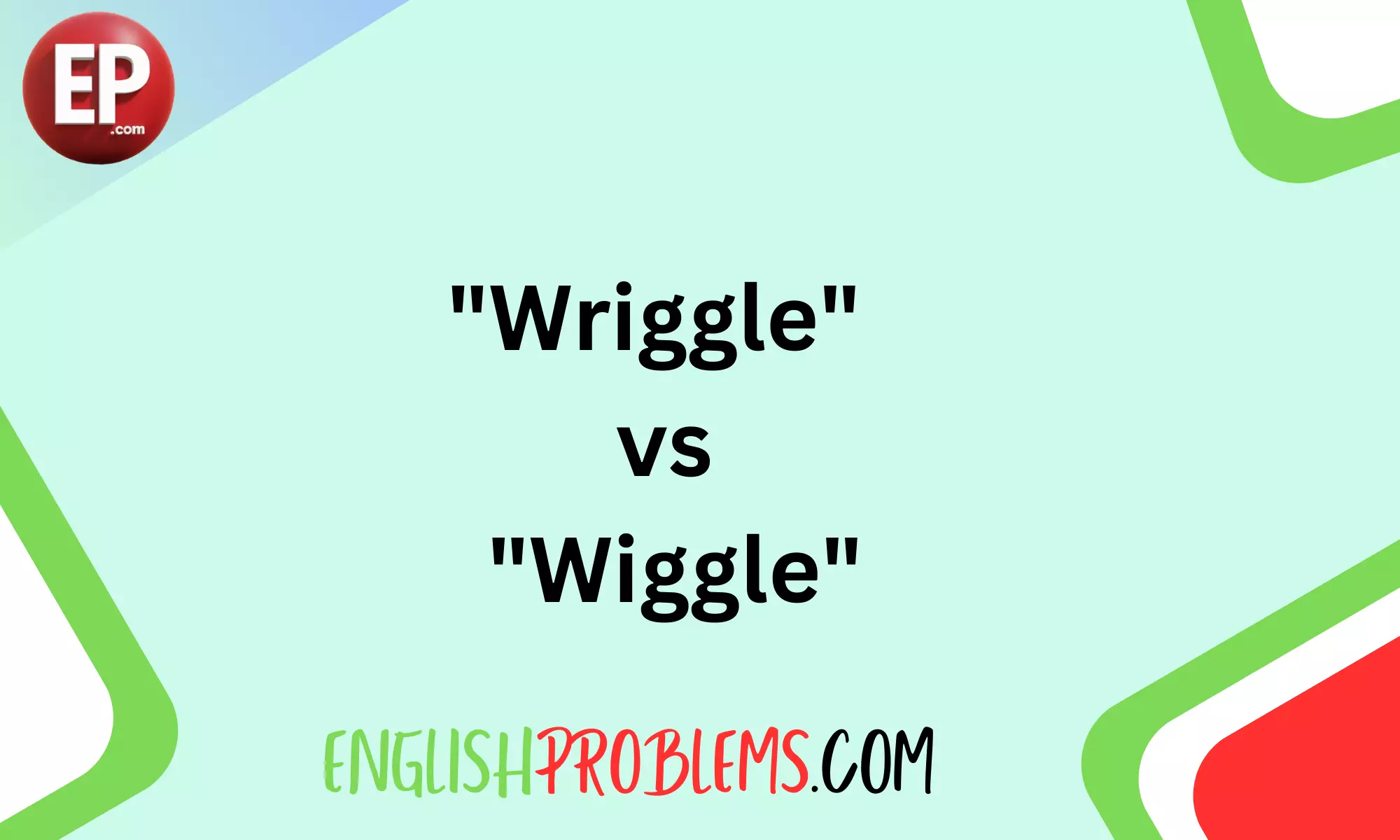Have you ever wondered why some people say “wriggle” while others prefer “wiggle”? These two words often seem interchangeable, but they carry distinct meanings and connotations. Understanding these subtle differences can enhance your communication and appreciation for the richness of the English language.
In this article, we’ll explore the origins, usage, and nuances of “wriggle” and “wiggle,” helping you navigate their meanings and contexts with ease.
The Origins and Evolution of “Wriggle” and “Wiggle”
Historical Background of “Wriggle”
The term “wriggle” has its roots in Middle English, derived from the Old English word “wrīgian,” which means to turn or bend. Over time, “wriggle” evolved to describe a specific kind of movement characterized by twisting and contorting. This word often conjures images of creatures like worms or snakes, which move by writhing their bodies.
Historical Background of “Wiggle”
“Wiggle,” on the other hand, emerged in the late Middle English period, originating from the Middle Low German word “wigelen,” meaning to move to and fro. Unlike “wriggle,” “wiggle” suggests a lighter, more playful motion. This term often evokes the image of a child shaking a toy or a happy dog wagging its tail.
Evolution of Both Terms
Both words have retained their core meanings over the centuries, but their usage has expanded and diversified. While “wriggle” often implies a struggle or effort, “wiggle” typically conveys a sense of freedom and joy. This evolution reflects the broader changes in the English language, influenced by cultural and social shifts.
Understanding the Nuances: “Wriggle” and “Wiggle” Explained
Defining “Wriggle”
Etymology and Meaning
“Wriggle” comes from the Old English “wrīgian,” meaning to turn or bend. Today, it describes a movement involving twisting or contorting the body.
Contexts and Examples of Usage
- Animals: “The worm wriggled through the soil.”
- People: “He wriggled in his seat, uncomfortable with the question.”
- Escape: “She managed to wriggle out of the tight space.”
Defining “Wiggle”
Etymology and Meaning
“Wiggle” derives from the Middle Low German “wigelen,” meaning to move to and fro. It suggests a light, playful movement.
Contexts and Examples of Usage
- Children: “The toddler wiggled with excitement.”
- Animals: “The puppy wiggled its tail joyfully.”
- Objects: “The loose tooth wiggled as she pushed it with her tongue.”
Comparing and Contrasting “Wriggle” and “Wiggle”
- Intensity: “Wriggle” often implies more effort and struggle, while “wiggle” suggests ease and playfulness.
- Context: “Wriggle” is frequently used in scenarios involving escape or discomfort, whereas “wiggle” is common in playful or casual contexts.
- Imagery: “Wriggle” evokes images of twisting and turning, often in a confined space, while “wiggle” conjures lighter, repetitive movements.
Wriggle Room vs. Wiggle Room: A Closer Look
What is “Wriggle Room”?
Definition and Common Contexts
“Wriggle room” refers to the flexibility or margin of freedom in a situation. It often implies a limited amount of space or opportunity to maneuver.
Examples in Sentences
- “The contract has little wriggle room for negotiation.”
- “We need some wriggle room to adjust the budget.”
What is “Wiggle Room”?
Definition and Common Contexts
“Wiggle room” is similar to “wriggle room,” indicating flexibility or freedom to make small changes. However, it often suggests a slightly more relaxed context.
Examples in Sentences
- “The schedule has some wiggle room for unexpected delays.”
- “Give yourself some wiggle room in your plans.”
Flexibility and Connotations Associated with Each Term
- Wriggle Room: Often used in more formal or constrained contexts, suggesting limited flexibility.
- Wiggle Room: Used in casual or everyday contexts, indicating a bit more freedom and ease.
Common Usage in Different Contexts
Everyday Language and Colloquialisms
Both “wriggle” and “wiggle” appear in everyday speech, often reflecting their nuanced meanings.
- Idioms and Phrases:
- “Wriggle out of a situation” implies finding a way to escape or avoid something.
- “Wiggle room” suggests having some flexibility or leeway.
Geographical Preferences for “Wriggle” and “Wiggle”
Different regions may prefer one term over the other due to cultural and linguistic influences.
Regional Differences in Usage
- United States: “Wiggle” is more commonly used, especially in casual contexts.
- United Kingdom: Both terms are used, but “wriggle” may appear more in formal writing.
Influence of Local Dialects
Local dialects and linguistic traditions can impact the preference for “wriggle” or “wiggle.”
Industry-Specific Use of the Terms
Business Contexts
- “Wriggle room” often appears in legal and contractual language, indicating limited flexibility.
- “Wiggle room” might be used in project management or scheduling, suggesting some allowance for adjustments.
Scientific Contexts
- In biology, “wriggle” describes the movement of certain animals.
- “Wiggle” might be used to describe particle behavior in physics or playful movements in animal behavior studies.
Artistic and Literary Contexts
- Writers and artists might use “wriggle” and “wiggle” to convey specific imagery and movement in their works.
Figuring Out Which Is More Prevalent: “Wriggle” or “Wiggle”?
Analysis of Frequency in Written and Spoken Language
Data from Linguistic Corpora
Analyzing data from linguistic corpora can reveal trends in the usage of “wriggle” and “wiggle.”
| Term | Frequency (per million words) | Common Contexts |
| Wriggle | 15 | Formal, biological |
| Wiggle | 30 | Casual, everyday |
Trends in Digital Media and Social Platforms
A quick search on social media platforms like Twitter and Instagram can show the prevalence of these terms in everyday language.
Case Studies and Examples from Popular Media
Case Study: Children’s Literature
In children’s books, “wiggle” is more commonly used due to its playful connotations.
Example from Popular Media
- Movie: In “Finding Nemo,” the character of Nemo often “wiggles” his fin, emphasizing his playful nature.
- Book: “Wiggly Worms at Work” by Wendy Pfeffer uses “wiggle” to describe the movement of worms in an engaging way for children.
Survey Results or Polls
If available, surveys can provide insights into people’s preferences and perceptions of “wriggle” and “wiggle.”
Example Survey Question
- “Which term do you use more frequently: ‘wriggle’ or ‘wiggle’?”
Practical Tips for Choosing Between “Wriggle” and “Wiggle”
Situational Guidelines for Using “Wriggle” or “Wiggle”
When to Use “Wriggle”
- Formal Writing: Contracts, legal documents, scientific papers.
- Describing Effort: Escape, struggle, confined movements.
When to Use “Wiggle”
- Casual Writing: Blogs, social media, everyday conversation.
- Describing Playfulness: Light, joyful, repetitive movements.
Tips for Writers and Speakers to Enhance Clarity and Precision
- Consider the Context: Think about the formality and imagery you want to convey.
- Audience Awareness: Tailor your word choice to the audience’s familiarity with the terms.
How to Decide Based on Audience and Context
- Formal Contexts: Opt for “wriggle” to emphasize effort or constraint.
- Casual Contexts: Use “wiggle” to suggest ease and playfulness.
Conclusion
Understanding the nuanced differences between “wriggle” and “wiggle” can enrich your communication and writing. By recognizing their distinct origins, meanings, and contexts, you can choose the right word to convey your intended message with precision and flair. Whether you’re negotiating a contract with “wriggle room” or watching a puppy “wiggle” with joy, these terms add color and specificity to our language.
Additional Resources
- Merriam-Webster Dictionary
- Oxford English Dictionary
- Linguistic Corpora
- Google Ngram Viewer
By diving into the intriguing differences between “wriggle” and “wiggle,” we gain a deeper appreciation for the subtleties of the English language and enhance our ability to communicate effectively.

Nicholas Clark is a master wordsmith with a passion for unraveling the complexities of the English language. With a keen eye for detail and a love for grammar, he transforms tricky language issues into engaging and understandable lessons. Nicholas’s insightful articles make mastering English a delightful journey.










